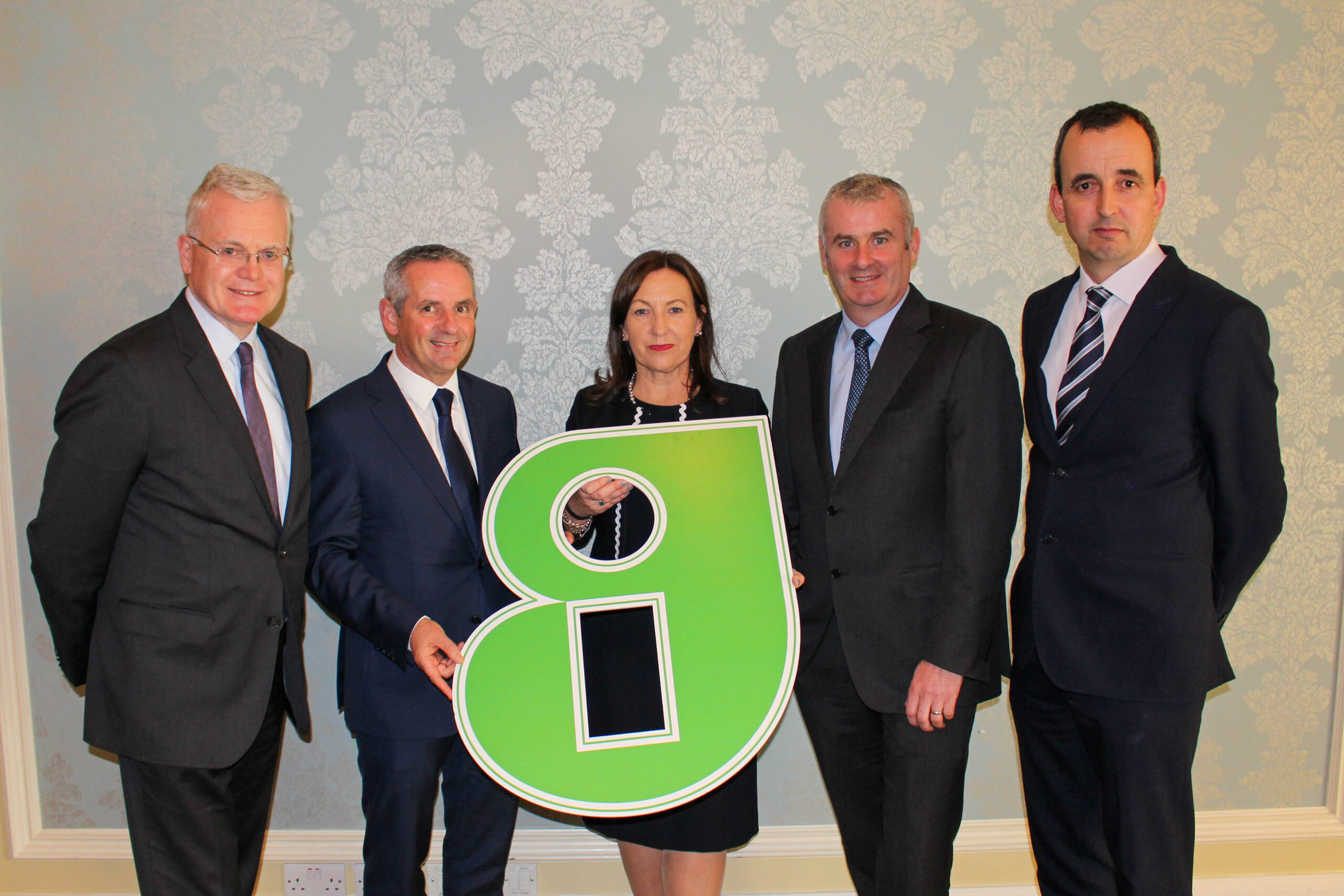Introduction
Guaranteed Irish celebrates ‘Pharmaceutical Month’ in October of each year. Now in its third year, the month aims to showcase the contribution Guaranteed Irish pharmaceutical and healthcare member companies make to the Irish economy, the high-quality jobs they provide, and the support provided to local communities and suppliers. Members of Guaranteed Irish in the pharmaceutical and healthcare sector include MSD Ireland, Uniphar, Janssen Sciences Ireland, KCI Medical Ireland, Hidden Hearing and many more.
As part of the 2019 Guaranteed Irish Pharmaceutical Month, Guaranteed Irish held a roundtable event to bring together stakeholders from across the healthcare sector as well as Government and State Bodies to discuss the importance of the sector and how we can sustain Ireland as a leading pharmaceutical hub in the coming years.
This position paper sets out the key topics and themes discussed at this event, as well as capturing some of the solutions and suggested actions required to successfully sustain a quality pharmaceutical sector in a post-Brexit Irish economy.
Participants & Panellists
The event saw a panel of experts discuss key topics of relevance to the sector, which were then discussed further by attendees. The panel of experts included:
- Ger Brennan, Managing Director, MSD Ireland (Human Health) – Chair
- Paul Reid, CEO, Health Service Executive
- Oliver O’Connor, CEO, Irish Pharmaceutical Healthcare Association
- Killian O’Driscoll, Director of Projects, National Institute for Bioprocessing Researching and Training
Please note that while the following paper is based on the concerns raised in discussion at the event, the views expressed are not necessarily endorsed by all contributors or their employers.
Summary of Key Actions
The four key actions that Ireland needs to focus on to ensure Ireland continues to position itself as a leading pharmaceutical and healthcare “hub” are as follows:
- Invest in creating the talent of the future – ensure all levels of our education system are geared towards creating the innovative minds needed to attract further STEM investment to Ireland
- Prioritise the attraction of Research and Development funding in Ireland – ensure Ireland is seen as a centre of excellence for pharmaceutical research and leads the way in this regard.
- Ensure patients in Ireland gain access to leading innovation in healthcare treatments – ensuring patients can access the medicines made here as early as possible.
- Partnering together for future growth. The sector, Government and all relevant bodies need to work together to ensure we identify key opportunities, ensure we have the structures and processes in place to maximise investment and are thinking ahead when it comes to the next wave of manufacturing and research innovation and excellence.
Guaranteed Irish is calling on Government and all relevant stakeholder bodies to commit to a collaborative process to review the findings highlighted above, to ensure that the Irish pharmaceutical industry can thrive consistently in the years ahead, ensuring jobs and careers in the pharmaceutical and healthcare sectors are safeguarded and that patients are provided with high-quality care.
Each of the areas are addressed in detail below.
Invest in creating the talent of the future:
Challenges:
- A key component of Ireland’s success in attracting high quality investment from the pharmaceutical sector is the availability of highly trained, highly skilled employees.
- There is a clear need to ensure we are focussed on the provision of highly skilled workforces in the future, meeting future manufacturing trends and ensuring an ongoing pipeline of critical skills in the pharmaceutical sector.
- How can Ireland position itself as a thought-leader in the provision of highly skilled employees, anticipating future trends and skills requirements and building in the education structures needed to meet these demands?
Solutions:
- Ireland must take a multi-stakeholder approach in this regard, bringing together representatives from across the existing pharmaceutical sector, key third level representatives, industry bodies such as BioPharmChem Ireland and IPHA, as well as Government and state agencies to ensure our approach is multi-faceted and future-facing.
- Collaboration is key to this approach in terms of identifying the future needs, building the structures and supports to meet and supply these needs and ensuring agility throughout to future-proof this process.
- Ireland must also remain competitive and therefore general challenges facing the workplace at large such as housing, travel infrastructure and beyond also need to be highlighted as a priority and addressed without delay.
PRIORITISE THE ATTRACTION OF RESEARCH AND DEVELOPMENT FUNDING IN IRELAND
Challenges:
- With such a flourishing pharmaceutical sector in Ireland and the fact that the world’s top ten pharmaceutical companies based here there is a clear opportunity for Ireland to strategically position itself as a centre of research and development excellence and attract additional investment in this regard.
- Irelandhas had great success in attracting and retaining investment in biopharma manufacturing by creating the right environment – we now need to ensure the environment is right for the next phase of biopharma innovation
- There are also severe and urgent issues that require addressing in the field of clinical research.
- Taking the example of oncology – Cancer Trials Ireland have had their funding cut back by €3 million meaning they have been unable to open trials in lymphoma, testicular and endometrial cancer which means people with these kinds of cancers cannot access the newest promising treatments.
- Such cutbacks from the Department of Health mean that the proportion of cancer patients choosing to be part of a trial has halved – from 3% in 2014 to 1.5% in 2018.
- Ireland is an outlier in not permitting our consultants dedicated time for research in their everyday roles.
Solutions:
- Future-fitting the biopharma industry should focus on ensuring the continuation of a positive, friendly environment which has seen €10bn invested in Irish facilities since 2019.
- Successive governments have focused primarily on the manufacturing environment but the biopharma industry work cross-collaboratively now more than ever.
- To this end, three areas need to be focused on:
- An Irish Life Sciences Office
- Supporting innovation through IP
- Greater Clinical Research
- Despite the considerable presence in Ireland of biopharmaceutical manufacturing, it has been concerning that the status of ‘Research’ in Irish government policy has been downgraded. No longer is there a full cabinet ministry dedicated to Science and/or Research.
- We believe that the future of the industry relies on a renewed focus on science and research as core values of the Irish proposition
- Intellectual property (IP) incentives are the scaffolding for biopharmaceutical innovation. They incentivise drug discovery, bringing forward new medicines which treat diseases and improve people’s lives.
- Ireland, along with Europe, has a role in protecting and strengthening IP incentives. We should reward the risks biopharmaceutical innovators take in discovering new treatments and cures. Lives and jobs depend on it.
- Globally, about 7,000 medicines are in development at any one time. Many of these are manufactured in Ireland. To make one medicine can cost more than €2 billion and take up to 13 years.
- Not all medicines make it to market – just one to two of every 10,000 substances in laboratories pass all stages of development needed to become a licensed new product. So, the industry bears all the risk, as well as the cost.
- These risks should be rewarded so that the industry can keep discovering new medicines
- Threats to the current IP framework will not lead to lower prices for medicines – instead it will lead to less drug discovery and less innovative, breakthrough treatments.
Solving the Access Impasse
Challenge:
- Ireland is falling behind other EU countries in ensuring timely patient access to the most innovative treatments. Latest data shows we rank 20th out of 27 European Countries in accessing new medicines.
- Ireland is slowest and last among 13 western European countries in bringing new cancer medicines to patients.
- In 2016, only 20% of new cancer medicines launched internationally over 2014-15 were available in Ireland, as compared with 40% in Portugal and 76% in Germany
- Early/expedited access to medicines is imperative for patients, who are suffering as a result of delays.
- Recent delays in patient access to medicines have resulted in significant media scrutiny and emotional testimonies from patients, their families and clinicians. Question marks have been raised about the access process, the complexity involved and the ability of Ireland to invest in new, innovative medicines.
- Current drug funding is insufficient to manage the new wave of unprecedented scientific innovations coming through as well as the changing population dynamics in Ireland.
- The proportion the health budget spent on medicines is lower in Ireland than the OECD average at 12.9% and as a percentage of GDP is less than 1 per cent (0.93% in 2017)
- More emphasis should be put and articulated in public about the value of medicines as distinct from the constant reference to high cost.
Solutions:
- We believe it would be in the interest of both government and industry to develop a Medicines Policy for Ireland with the overall collective aim of ensuring the patient is put first
- A National Medicines Policy would:
- Create a new National Medicines Office, led by a Chief Medicines Officer, allowing for a clear, transparent and personable system that puts the patient first;
- Commit to a multi-year budgetary framework that would guarantee investment in new medicines while creating savings in existing medicines;
- Allow a greater role for patients in the decision-making process, moving them from the Dail gates to the boardroom table;
- Create a solution that would allow Irish patients access to new and innovative therapies as fast as – if not faster than – the rest of Europe;
- Create budgetary certainty for the State by moving to a new multi-year contracting for medicines.
- While the industry recognises the need to have a full and rigorous analysis of new medicines based on cost-effectiveness, all parties must consider that lengthy delays in this process hit the patient hardest. A scheme that would allow patients access to these potentially life-changing medicines at an early stage will ultimately have a net benefit to the overall health service.
- International models should be examined to identify best practice and how new approaches can coexist with current processes which are not optimal for patients or clinicians.
- Some of our European counterparts have grabbed this nettle and have recognised the need to move to a multi-annual funding framework while guaranteeing a modest increase in the medicines budget. Belgium’s Pact for the Future overhauled their approach to medicines access. Their rate of medicines access is now 56% as opposed to Ireland’s 41% (IQVIA, 2018)
- The current system of accessing new medicine is not working. All stakeholders – including the industry and the State – need to commit to working towards a National Medicines Policy.
THE PAYER’S PERSPECTIVE – THE HSE
Paul Reid, CEO of the Health Service Executive, gave an alternative perspective on the issues around access to medicines and the role of government and industry in coming to a new solution.
- There is an obligation on the HSE, under the Health Act to get the best value from all spend, including in the area of medicines
- The industry hugely values innovation and IP, which must be supported. However, innovation should also result in reduced costs and price in certain areas of the health budget – as we have seen with generics and biosimilars
- There have been moves to increase international cooperation – Ireland has entered into the Beneluxa agreement to seek stronger value in terms on drugs and medicine purchase.
- Any delays in bringing new drugs to market cannot be solely put at the door of the HSE. The industry needs to review its negotiation approach in this process
- The HSE will continue to seek value for money for the tax payer and to ensure that our spend on medicines and drugs delivers on this.
- Partnership between all parties – government and industry – will be a key focus for delivering a successful solution to any perceived access impasse
Partnering together for future growth
Challenge:
- How can we ensure there is genuine collaboration across all relevant stakeholders to future-proof the pharmaceutical sector in Ireland, ensure we are working together for the good of the healthcare landscape in general and taking steps today to ensure success tomorrow and beyond.
Solutions:
- The biopharma industry is at the cutting-edge of manufacturing tomorrow’s cures.
- If we look to future partnership, there are two areas where the State and the industry can work positively together:
- Future Jobs
- Sláintecare and the Healthcare System
Future Jobs:
- The industry has been working with the Department of Business, Enterprise and Innovation to ensure that biopharma innovation is included in the next wave of Future Jobs
- A number of recommendations have been made to the Government:
- Make Ireland a player of European consequence in unlocking tomorrow’s treatments and cures
- Harness the potential of data – gathering and analysing it for outcomes-based measurement and personalised healthcare
- Set an ambitious target for the conduct of clinical trials.
- Fix Ireland’s problem accessing new medicines.
- Publicly and privately support the industry’s reputation and partnership-building efforts
- The industry has been heartened by the response to these recommendations but if we are to future-proof biopharma innovation in Ireland, Ireland needs to value biopharma innovation.
- Brexit has caused a major shake-up for the industry – changing supply chains, ensuring continuation of supply.
- As we look towards an uncertain time, the reason we can be so confident in supply and manufacturing is because we’ve been planning for a ‘No Deal’ scenario since June 2016.
- Such minute planning should provide the incentive to Government to ensure such high-value jobs and manufacturing continues into the future.
- This collaborative approach has also demonstrated the value of industry, Government and the healthcare sector working together to find innovative solutions to common challenges and should be replicated in other areas such as access to medicines and affordability.
Slaintecare and the Healthcare System
- Looking at the healthcare system – the State does have a long-term, ambitious strategic plan – Sláintecare.
- The aim of Sláintecare is to create a universal health system that ensures the Irish population live longer, healthier lives
- Innovative medicines and vaccines – what we produce – have been proven to lead to longer, healthier lives.
- This should be our shared goal and should inform industry interactions with Government as we work towards a new IPHA agreement in 2020.
- One of Slaintecare’s fundamental principles is the ‘Patient is Paramount’ – if Brexit has been a lesson in partnership for the national interest, perhaps this could be the keystone for our next partnership.
- Our medicines access system is broken. We – the industry and government – need to make innovative collective decisions on how we ensure timely access to new treatments for the betterment of Irish patients.
Conclusion:
Ireland has established itself as a global pharma and medtech hub in recent years, with two dozen of the world’s top 25 pharmaceutical companies now calling Ireland home. The pharmaceutical and medtech industry in Ireland employs over 30,000 people directly, with many more indirect jobs created as a result. According to recent data published by the CSO, Ireland is currently the second-largest exporter of medtech products in Europe with €12.6 billion generated from the export of such products. In total, we are the 7th largest exporter of medicinal and pharmaceutical products in the world and the sector is worth €39 billion annually in exports, accounting for 50% of all exports.
However we cannot afford to be complacent regarding this pivotal industry and all stakeholders involved in this sector must work together to identify the key challenges facing the future of the industry and future investment, agree the steps we need to take to future-proof the sector and put in place a pro-active strategic plan to ensure we continue to position Ireland as a pharmaceutical and healthcare hub of innovation and invention.
For more info:
Guaranteed Irish, the national symbol of trust and provenance, is a business membership organisation championing 600 + homegrown and international businesses operating in Ireland. We award the Guaranteed Irish symbol to companies which create quality jobs, contribute to local communities and are committed to Irish provenance.
Guaranteed Irish celebrates 45 years this year supporting all businesses in Ireland. Having positioned themselves as the voice of certainty for industry, both indigenous and international, Guaranteed Irish is calling on the Government to ensure Ireland’s pharmaceutical industry is supported in research investment, access to technology and medication and with future talent.





